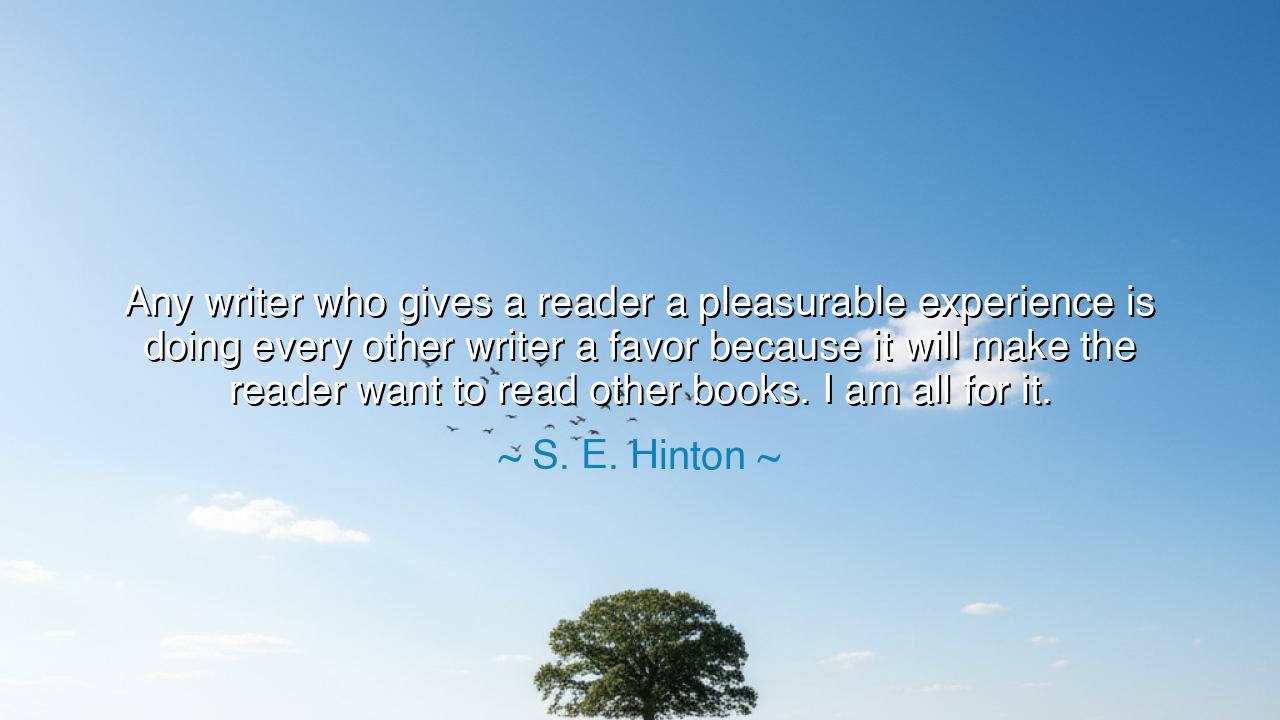
Any writer who gives a reader a pleasurable experience is doing
Any writer who gives a reader a pleasurable experience is doing every other writer a favor because it will make the reader want to read other books. I am all for it.






In the quiet wisdom of the ages, S. E. Hinton spoke words that echo beyond her time: “Any writer who gives a reader a pleasurable experience is doing every other writer a favor because it will make the reader want to read other books. I am all for it.” These are not the words of rivalry, but of fellowship — the voice of one who understands that art, like light, grows brighter when shared. In her saying lies the truth that the writer’s gift is not hoarded glory, but the stirring of a flame that others, too, may tend. For every story that awakens joy or wonder prepares the heart to seek another, and another, and thus the realm of words endures.
In the time of the ancients, storytellers were not competitors, but keepers of the flame. One voice would tell of gods and heroes; another would add new names, new deeds, new wisdom. Each tale invited the listener deeper into the forest of imagination, until he no longer wished to leave. So it is in our age with books — every pleasurable experience becomes a sacred offering to all who write. For a reader who has once known delight in the written word becomes a pilgrim of literature, seeking again that same light in other pages, in other hearts.
Remember, then, the story of Charles Dickens, who, in the shadowed streets of London, lifted the weary souls of his people through his tales. Many who first read A Christmas Carol had never before held a book in joy; yet afterward, they sought others — stories of laughter, sorrow, and redemption. Dickens did not only write for himself; he opened the door for countless others. In that act, he proved Hinton’s truth: when one writer moves the soul, he awakens the hunger for all that words can offer.
The essence of Hinton’s teaching lies in generosity — that true artistry is not born from envy, but from a spirit that rejoices when another voice is heard. The writer who delights her readers does not steal from her peers; she builds a bridge toward them. Each beloved story expands the circle of readers, nourishes their curiosity, and strengthens the sacred bond between author and audience. To give pleasure in reading is to give life to literature itself, for the joy of one book becomes the anticipation of the next.
Let us not forget that such joy is not shallow pleasure but deep connection. When a reader feels seen, uplifted, or transformed, that emotion lingers like the scent of incense in a temple. It softens the heart toward all who labor in the same craft. It teaches that creation is not competition, but communion. The writer’s victory is not measured in applause or fame, but in the quiet turning of another page, the breathless waiting for another tale.
From this truth arises a lesson for every creator and seeker: create to awaken, not to compare. Write not to surpass, but to inspire. When you speak or craft or dream, do so in such a way that your work kindles curiosity in others — for that is the highest service of art. The generous artist becomes a beacon, drawing souls toward beauty they might otherwise never find.
And for those who read, there lies also a sacred duty: honor the writer who gave you joy by continuing the journey. Seek more stories. Share them. Speak of them around your own hearth, as the ancients once did beside the fire. In doing so, you become part of the eternal chain of creation — where every voice strengthens the next, and every light rekindles another.
So let these words of S. E. Hinton be carved upon the hearts of all who love the written word: the pleasure you give in your art becomes the seed of another’s passion. And the world, through that simple act of shared delight, is made more awake, more connected, more alive. For when one writer gives joy, all writers rise.






AAdministratorAdministrator
Welcome, honored guests. Please leave a comment, we will respond soon